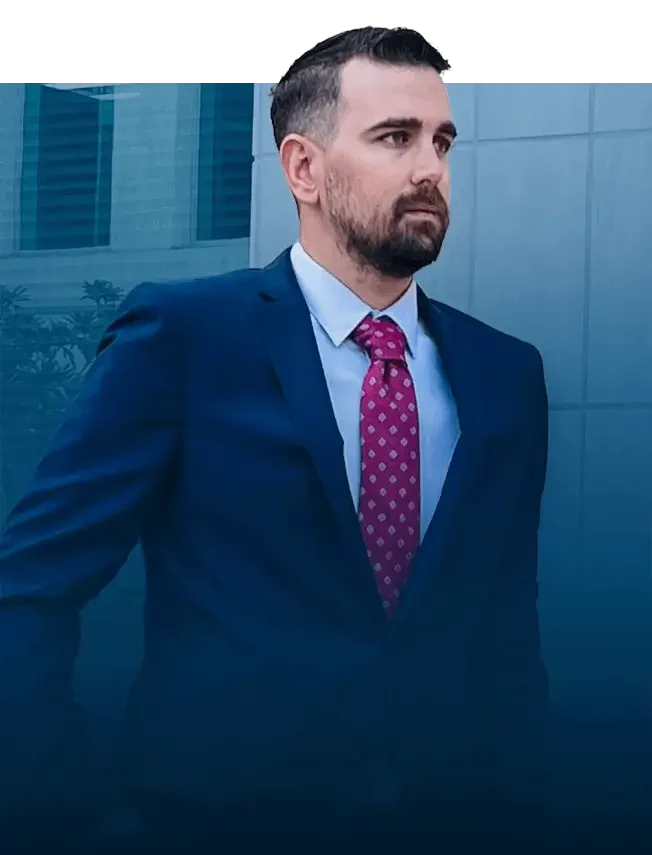
From our Walnut Creek law firm, our leading attorneys serve injury victims throughout Oakland, Livermore, Fairfield, and Antioch, California. Reach out today and schedule a free consultation with us to discuss your injury claim.
You should feel confident in your legal partner. Our attorneys offer over 60 years of combined legal experience and are ready to advocate for you
A trustworthy attorney can make all the difference. You can count on us to pursue the maximum financial compensation you need for recovery.
You deserve to understand what your options are. With our knowledge & Spanish-speaking capabilities, we can make complex legal terms accessible.

Workers' Compensation & Personal Injury Attorneys in Walnut Creek, California
Practice Areas
Partner With Attorneys You Can Trust
Brand Peters PC is unique because of our ability to handle both personal injury and workers’ compensation cases. From construction accidents to traffic collisions, our attorneys have ample experience in mediating and litigating wide a range of case types.
Accident insurance should give you peace of mind when misfortune strikes. But sometimes, insurance companies will attempt to avoid their responsibilities to cut costs. If you or a loved one has been injured at work or because of a different act of negligence, don’t hesitate to call our Bay Area law firm. We proudly serve those throughout Oakland, Livermore, Fairfield, and Antioch, California.
Case Results
$3,787,502
Worker Struck by Tree Trunk
Head and neck injury as a result of being hit by a tree trunk. Client obtained lifetime benefits totaling $2,399,198.00 and $1,388,304.12 in past medical paid. The total value of benefits obtained $3,787,502.00
$2,796,023
Failed Back Surgery
Failed back surgery case. $2,796,023.00 obtained for medical, temporary disability, permanent disability. Lifelong benefits obtained.
$2,626,750
Fall on the Job
Sheet metal worker falls on the job site, suffers back, neck, and knee injuries. Offered $1.5 million but, after a 3-week jury trial, was rewarded $2,626,750, which included costs related to past and present medical bills, pain, and suffering, and lost earnings capability.
Don’t Settle For Less
We Fight to Right the Wrongs
After being injured in an on-the-job accident, you should not hesitate to obtain the help of a workers’ compensation attorney from Brand Peters PC. With extensive experience in all matters related to work injury claims and filing for workers’ compensation, you can trust us to represent you. We also assist clients who are struggling with a range of matters related to workers’ compensation, including eligibility requirements, obtaining medical treatment, and obtaining temporary disability benefits. No matter how complex your situation may be, our workers’ comp attorneys are here to help you move forward.
We have the resources and skills to handle claims that involve multiple parties and lengthy settlement processes. If you or someone you love has been hurt in an accident, one of our personal injury attorneys will fight for the fair compensation you need to navigate the recovery process and rebuild your life after the misfortune. We have successfully represented thousands of injured clients throughout the San Francisco Bay area and are ready to provide you with the care and support you deserve. Call us at (925) 489-0746 today in Walnut Creek, California, to schedule your free initial consultation.
Contact Us Today!
Testimonials
I could not ask for a more knowledgeable team when it comes to the ever-changing workers’ compensation laws.
I Can’t Imagine Anyone Else to Have Represented Me or A Better Resolution.
I Am Extremely Satisfied with The Representation by Mr. Brand in My Legal Matter.
I Am Thoroughly Pleased and Can Now Move on With My Life.
Our Blogs

What Damages Can I Recover in a Personal Injury Case in Walnut Creek?
If you are injured because of someone else’s negligence in Walnut Creek, California law allows you to seek compensation for financial losses, personal harm, and, in rare cases, punitive damages. The exact damages available depend on the facts of the incident, the evidence, and how fault is shared.
Understanding the categories of damages helps injured individuals know what may be recoverable before speaking with a lawyer.
Understanding Damages in a California Personal Injury Case
In California, damages in a personal injury case are intended to compensate an injured person for harm caused by another party’s wrongful conduct. The goal is not to provide a windfall, but to account for losses tied to the injury.
Most personal injury damages fall into three broad categories:
- Economic damages
- Non-economic damages
- Punitive damages (available only in limited circumstances)
Each category follows different legal rules, which can affect how claims are evaluated and resolved.
Economic Damages: Measurable Financial Losses
Economic damages represent the out-of-pocket and financial costs associated with an injury. These damages are often easier to identify because they are supported by records, invoices, and employment documentation.
Medical Expenses
Medical costs often form the foundation of a personal injury claim. These may include:
- Emergency care and hospitalization
- Surgery and follow-up treatment
- Physical therapy or rehabilitation
- Prescription medications
- Medical equipment or assistive devices
- Future medical care when supported by evidence
In California, disputes sometimes arise over how past medical expenses are calculated, particularly when health insurance is involved. Courts have addressed whether recoverable medical damages are based on amounts billed versus amounts actually paid or accepted as payment in full.
This issue frequently appears in personal injury litigation and highlights why accurate medical documentation matters.
Lost Income and Reduced Earning Capacity
Injuries can interrupt a person’s ability to work. Economic damages may account for:
- Wages lost during recovery
- Missed overtime or bonuses
- Reduced earning capacity when injuries affect long-term work ability
These losses are often supported by pay stubs, tax records, employer statements, or vocational assessments.
Out-of-Pocket Expenses
Some injury-related costs do not fit neatly into medical bills or wages. These may include:
- Transportation to medical appointments
- Home care or assistance during recovery
- Necessary household modifications
- Replacement services when an injured person cannot perform normal tasks
Property Damage
In cases involving vehicle accidents or other incidents that cause property loss, damages may include the cost of repairs or the fair market value of damaged property, depending on the circumstances.
Non-Economic Damages: The Human Impact of an Injury
Non-economic damages address the personal and emotional consequences of an injury that do not come with receipts. While harder to quantify, these damages are often central to personal injury cases.
Common examples include:
- Physical pain and discomfort
- Emotional distress and mental suffering
- Loss of enjoyment of daily activities
- Physical impairment or limitations
- Scarring or disfigurement
California law recognizes that injuries affect more than finances. Non-economic damages are designed to reflect how an injury changes a person’s daily life, relationships, and overall well-being.
When multiple defendants are involved, California generally applies proportional responsibility rules for non-economic damages. Each defendant may be responsible only for their share of fault rather than jointly paying the entire amount.
Punitive Damages: Rare and Fact-Specific
Punitive damages are not available in most personal injury cases. They are not intended to compensate the injured person, but to punish particularly egregious conduct and deter similar behavior.
Under California law, punitive damages are typically tied to conduct involving:
- Malice
- Oppression
- Fraud
These claims require a higher level of proof than ordinary negligence and often involve intentional harm or conscious disregard for the safety of others.
Because of this higher threshold, punitive damages are uncommon and depend heavily on the specific facts of a case.
How Fault Affects Recoverable Damages in California
California follows a pure comparative negligence system. This means fault can be shared between parties, and damages may be reduced based on an injured person’s percentage of responsibility.
For example, if someone is found partially at fault for an accident, their recoverable damages may be reduced accordingly rather than eliminated altogether.
This system frequently plays a significant role in how personal injury cases are evaluated and resolved.
Special Rules That May Limit Damages in Certain Cases
Not all personal injury claims are treated the same under California law. Some situations involve additional statutory rules that can affect damages.
Motor Vehicle Cases and Non-Economic Damages
In some auto accident cases, California law places restrictions on non-economic damages depending on insurance status and other factors. These limitations do not apply universally, but they are often relevant in vehicle-related injury claims.
Medical Malpractice Cases
Medical malpractice claims follow a separate legal framework from standard personal injury cases. Non-economic damages in medical malpractice cases are governed by specific statutes and are evaluated differently than injuries arising from car accidents, premises liability, or other incidents.
For Walnut Creek readers, it is important to understand that medical malpractice is a distinct category, and rules applicable to those cases do not automatically apply to other personal injury claims.
Timing Matters: Deadlines That Can Affect Recovery
It is important to understand that deadlines can directly affect the ability to recover damages.
Many California personal injury claims are subject to a general filing deadline. However, cases involving government entities, public property, or certain defendants may involve shorter notice requirements and additional procedural steps.
Because evidence, medical records, and witness recollections can fade over time, early documentation is often critical when evaluating damages.
What Walnut Creek Injury Victims Often Ask About Damages
People researching damages after an injury often seek clarity on several common points:
- Damages are evidence-driven. Medical records, wage documentation, photographs, and consistent treatment often matter more than general descriptions of pain.
- Not all losses are treated the same. Economic, non-economic, and punitive damages follow different rules under California law.
- Fault allocation can reduce recovery. Shared responsibility may affect the final outcome even when another party caused the incident.
- Some cases involve unique limitations. Vehicle accidents and medical malpractice claims may be subject to additional statutory considerations.
How This Relates to Personal Injury Cases Handled by Brand Peters PC
Personal injury cases require careful evaluation of both legal rules and real-world evidence. At Brand Peters PC, the focus is on representing injured individuals in Walnut Creek and surrounding areas by identifying the full scope of damages supported by the facts of each case.
This includes reviewing medical records, employment impacts, and the practical ways an injury has affected a client’s life. Every case is different, and damages are assessed based on the unique circumstances involved.
Final Thoughts
Understanding what damages may be recoverable in a Walnut Creek personal injury case helps injured individuals ask informed questions and recognize what information matters most.
While no article can predict outcomes or replace individualized legal guidance, knowing the basic categories of damages provides a useful starting point.
If you have questions about a personal injury matter and would like to discuss your situation with a lawyer, you can contact Brand Peters PC to request a consultation. Call (925) 489-0746 to get started.
Disclaimer: This article is for informational purposes only and does not constitute legal advice. For legal guidance tailored to your specific situation, consult a licensed attorney.

Third-Party Liability Claims in Construction Accidents: Walnut Creek
If you are injured on a construction site in Walnut Creek, workers’ compensation may not be your only option. In certain situations, California law allows injured construction workers to pursue third-party liability claims against individuals or companies other than their employer.
These claims can play a critical role in addressing losses that workers’ compensation does not fully cover. Understanding how third-party liability works, and when it may apply, is often essential for injured workers seeking accountability and financial stability after a serious construction accident.
Construction Accidents in Walnut Creek: A Multi-Party Environment
Construction projects throughout Walnut Creek and Contra Costa County typically involve multiple entities operating at the same site. A single project may include a property owner, a general contractor, several subcontractors, equipment suppliers, inspectors, delivery drivers, and outside vendors. This layered structure increases the likelihood that an injury may involve negligence by someone other than the injured worker’s direct employer.
California’s workers’ compensation system is designed to provide prompt medical care and wage replacement benefits for job-related injuries. However, workers’ compensation generally limits the ability to sue an employer directly. When another party’s actions contribute to a construction accident, a third-party claim may be available under California law.
What Is a Third-Party Liability Claim?
A third-party liability claim is a civil personal injury claim brought against a party other than the injured worker’s employer. These claims exist alongside workers’ compensation and focus on whether a non-employer’s negligence or misconduct contributed to the injury.
In construction accident cases, third-party claims often arise because job sites are shared environments where responsibility for safety and equipment is divided. California law allows injured workers to seek compensation from third parties even when workers’ compensation benefits are already in place.
Workers’ Compensation and Third-Party Claims: How They Interact
Workers’ compensation is commonly described as the “exclusive remedy” against an employer for job-related injuries. This means that, in most cases, an injured employee cannot sue their employer for negligence. That limitation does not automatically extend to third parties.
Third-party claims operate separately from workers’ compensation and may address losses such as pain and suffering or other damages not typically available through workers’ compensation benefits. When both claims exist, the legal process may involve coordination between the workers’ compensation case and the civil injury claim.
In many situations, workers’ compensation insurers may have reimbursement rights if a third-party recovery occurs. These issues are governed by California statutes and are often fact-specific.
Common Third Parties in Walnut Creek Construction Accidents
Construction accident investigations often focus on identifying who controlled the work, equipment, or environment where the injury occurred. Third-party defendants may include:
Other Contractors or Subcontractors
On busy construction sites, different contractors frequently work in close proximity. An injury may result from unsafe practices, poor coordination, or hazardous conditions created by a contractor other than the injured worker’s employer.
Property Owners
Property owners may be involved in site oversight, scheduling, or safety planning. While California law places limits on owner liability, property owners can still be relevant in certain construction accident cases depending on the facts and contractual arrangements.
Equipment Manufacturers and Suppliers
Defective tools, scaffolding, lifts, harnesses, or heavy machinery can lead to serious injuries. In those situations, claims may focus on product liability theories involving design defects, manufacturing defects, or inadequate warnings.
Delivery Drivers and Outside Vendors
Construction zones frequently interact with public roadways and delivery services. Accidents involving trucks, commercial vehicles, or third-party drivers may raise additional liability issues.
Public Entities
Some construction projects involve public property or government oversight. Claims involving public entities are subject to special procedural requirements and shorter deadlines under California law.
California’s Unique Rules on Construction Site Liability
California construction accident claims are shaped by specific legal doctrines that do not apply in all states. One of the most significant is the Privette doctrine, which generally limits when a property owner or hirer of an independent contractor can be held liable for injuries to that contractor’s employees.
Under this framework, courts often presume that responsibility for workplace safety has been delegated to the independent contractor. However, this presumption is not absolute. Certain exceptions may apply depending on factors such as retained control, site conditions, or the nature of the hazard.
Because these determinations depend heavily on contracts, job site roles, and real-world conduct, construction accident claims often require careful factual analysis rather than simple assumptions about responsibility.
The Role of Safety Regulations and Cal/OSHA Standards
Many construction accidents involve alleged violations of safety regulations. California’s workplace safety rules, including Cal/OSHA standards, may be relevant in evaluating how an injury occurred and whether safety obligations were followed.
Courts have addressed how safety regulations may be considered in civil negligence cases, particularly when claims are brought against non-employer defendants. While regulatory violations do not automatically establish liability, they can provide context for evaluating safety practices and responsibilities.
Deadlines That Can Affect Third-Party Construction Claims
Timing is often a critical factor in construction accident cases. Although each situation is different, injured workers commonly encounter two major timing frameworks in California:
Personal injury claims are often subject to a general statute of limitations that may allow up to two years to file a lawsuit. Claims involving public entities frequently require earlier notice, sometimes within six months of the injury.
Because deadlines may vary depending on the parties involved and the nature of the claim, understanding the applicable timeline is an important part of any third-party liability analysis.
Evidence That Often Matters in Third-Party Construction Cases
Determining whether a third-party claim exists usually depends on evidence gathered early in the process. While injured workers are not expected to investigate cases themselves, certain types of information often prove helpful during legal review.
This may include identifying which companies were present on the site, documenting the condition of equipment or work areas, preserving incident reports, and noting witness information. Medical records and workers’ compensation documents also help establish timelines and injury details.
How Third-Party Claims Differ From Workers’ Compensation
Workers’ compensation focuses on providing defined benefits without requiring proof of fault. Third-party claims, by contrast, generally involve fault-based analysis and may address broader categories of loss.
This distinction is why third-party liability claims can be particularly significant in serious construction accidents involving long-term injuries or permanent impairment. These claims are not automatic, but when they apply, they may change the scope of potential recovery.
Why Walnut Creek Construction Accidents Present Unique Challenges
Walnut Creek construction projects often involve mixed-use developments, infrastructure improvements, and work near active public spaces. These conditions increase the complexity of determining who controlled safety measures and how hazards developed.
Questions frequently arise about whether the injury occurred in an area controlled by the employer or another party, whether safety responsibilities were shared, and whether public entities or outside vendors were involved. Each of these factors can affect whether a third-party claim is available.
How Brand Peters PC Approaches Construction Accident Claims
Brand Peters PC represents injured workers and accident victims throughout Walnut Creek and the surrounding areas. The firm’s practice focuses on both workers’ compensation and personal injury, allowing for a comprehensive evaluation of construction accident cases where third-party liability may exist.
By examining how workers’ compensation benefits interact with potential third-party claims, Brand Peters PC helps clients understand the full legal landscape following a construction injury. This approach is especially important in complex construction cases involving multiple companies, contractors, or insurers.
Understanding Your Legal Options After a Construction Accident
Construction accidents can create uncertainty, particularly when multiple parties are involved. While workers’ compensation may provide an immediate safety net, it does not always tell the whole story. Third-party liability claims exist to address situations where someone outside the employer-employee relationship contributed to the harm.
Every construction accident is different, and determining whether a third-party claim applies depends on detailed facts, contracts, and legal standards under California law. Gathering accurate information and understanding how these claims work is often the first step toward clarity.
Contact Brand Peters PC
If you were injured in a construction accident in Walnut Creek and have questions about how workers’ compensation and third-party liability claims may apply, Brand Peters PC can help evaluate your situation and explain the legal framework involved. To learn more or request a consultation, call (925) 489-0746 to speak with the firm.
Disclaimer: This article is for informational purposes only and does not constitute legal advice. For legal guidance tailored to your specific situation, consult a licensed attorney.